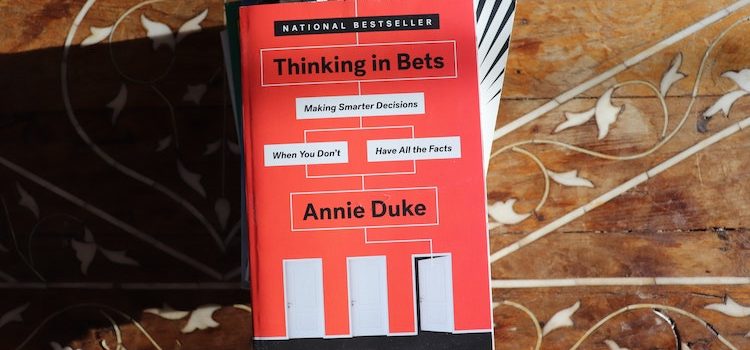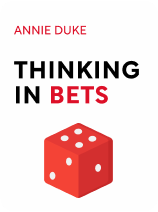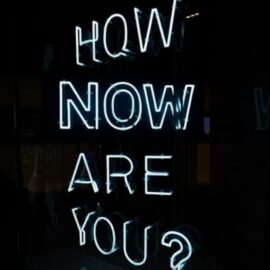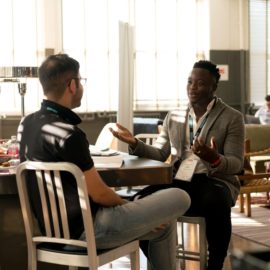

This article is an excerpt from the Shortform book guide to "Thinking in Bets" by Annie Duke. Shortform has the world's best summaries and analyses of books you should be reading.
Like this article? Sign up for a free trial here .
Have you read Thinking in Bets, Annie Duke’s book about decision-making? What application does it have for your life?
In Thinking in Bets, Annie Duke shares strategies that can help you become more consistently rational and intellectually flexible. When you think in bets, you start with a foundation of well-informed beliefs, you become adept at learning from the outcomes of your past decisions, and you find a group of people who can help stop you from slipping into ineffective habits. These three building blocks—beliefs, outcomes, and groups—are the core of Duke’s philosophy.
Keep reading to learn how to think in bets.
Thinking in Bets: Annie Duke’s Philosophy
In Thinking in Bets, Annie Duke discusses how her decades-long poker career helped her refine her approach to decision-making and develop strategies that can be applied to day-to-day life and business settings.
She left her doctoral studies in cognitive psychology, took up poker to earn a little money, and ended up becoming a professional poker player whose 20-year career would garner over $4 million in earnings. The game enabled her to observe how other people make decisions in a setting where every choice leads to one of two clear outcomes—winning or losing money—and those outcomes serve as feedback about the quality of your decisions. In the early 2000s, she began sharing her strategies with professionals across such fields as finance, law, and business.
Her process boils down to “thinking in bets,” or re-framing every decision as a “bet” against yourself. When you “think in bets,” you will:
- Learn not to judge the quality of a decision solely on the outcome it produces
- Move away from reactive decisions and toward objectivity
- Understand the value in having a group of like-minded individuals whose support and dissent can help you vet your decisions
So let’s break down what it means to “think in bets.”
Vetting Your Beliefs
In Thinking in Bets, Annie Duke argues that the decisions you make are ultimately driven by beliefs. You believe that job will be more fulfilling than this one. You believe you’ll like living in a big city better than your small town. You believe cardio is good for your heart and you believe that you’ll live happily ever after with your partner. Some of these beliefs are based on our direct experiences. But you might be surprised by how often false beliefs creep into our heads and stick there. Making a habit of interrogating your beliefs is essential to making good decisions.
A series of experiments by a Harvard psychology professor showed that we tend to process information as true even if it is explicitly presented as false, especially if we’re under pressure. Unless we’re given a reason to question those beliefs, vet them, and do the research necessary to acquire the facts, those wrong beliefs stick—and sometimes they’ll stick even after they’ve been debunked.
From there, those old beliefs can influence how we perceive new information, feeding back into our existing biases and intensifying them. This cycle is called “motivated reasoning.” That’s why the phenomenon known as fake news is so insidious, and so effective. It’s not converting anyone to a brand new way of thinking—it’s designed to reinforce existing beliefs.
Similarly, every few years, news articles claiming there’s no scientific proof that flossing is necessary go viral. Many people are eager to share and believe these articles without researching beyond the headlines. Why? Because they just don’t like flossing. They’re biased in favor of anything that makes them feel less guilty about not flossing often enough. Dentists do continue to recommend flossing daily, and the claims that “science” doesn’t support a need to floss have many caveats attached. But the articles still get written and shared, not because they’re revelatory, but because they reinforce existing feelings and beliefs.
In Thinking in Bets, Annie Duke asserts that, to make good decisions, you have to fight against motivated reasoning; you have to make sure your beliefs are rooted in objectivity. How do you do that?
1. Imagine you had to place a bet on every belief you hold.
If being wrong about something suddenly came with an immediate financial penalty, you’d be a lot more likely to examine that belief, second-guess yourself, and do some fact-checking. The reality is that you won’t have to pay for most of the misconceptions you might hold in cold, hard cash, but many beliefs do carry a penalty when they influence your choices: the alternative futures you might have had if you’d made a different decision.
2. Acknowledge that there’s likely some uncertainty in most beliefs you hold.
The more you scrutinize your beliefs, the more you’ll start to realize there aren’t many things you feel confident enough about to bet money on, and that’s okay. Even scientific concepts are constantly being updated or disproven. You don’t have to be completely sure of every belief you hold, but it’s good to think about how sure you are. There’s a range of certainty, differing levels of confidence, for every belief you hold.
Learning From Outcomes
Before you can get better at making decisions, you have to get better at learning from the decisions you’ve made in the past.
Embrace Uncertainty
In a bet, you know that even if the odds are in your favor, there’s a chance you could lose. Betting means knowing you don’t have all the information; you have to use your best judgment in the face of risk and uncertainty. Decisions are the same. You weigh the odds and hope for the best outcome.
Avoid black-and-white thinking—or viewing things as being either totally right or totally wrong. Most things, including the decisions you make, will be somewhere in between. In the ideal decision-making process, you evaluate your choices and pick the option with the highest chance of success. You may also take measures to reduce the possibility of failure even if you can’t get rid of it completely. If the less likely, unfavorable outcome is what you get, it could mean:
- You got unlucky.
- You didn’t have any good choices.
- There was information you didn’t have.
- You decided the potential reward was worth the risk.
- You didn’t make the best possible choice, but you didn’t make the worst choice, either—you picked something in between for reasons that made sense to you at the time.
None of these factors means that your process was bad or your decision was “wrong.” And if all the choices available to you carry a degree of uncertainty, a chance of failure, you can learn to evaluate which one is the least likely to fail. By thinking about not only whether you’re unsure, but also how unsure you are, your guesses become more educated.
Avoid Resulting
In Thinking in Bets, Annie Duke warns against resulting in decision-making. “Resulting” is a poker term that refers to our habit of judging a decision based solely on the outcome it produced. It’s dangerous because it can lead you to believe you have to change your strategy based on one bad outcome. What if the bad outcome was due to luck, rather than the quality of your decision? In that case, changing your strategy won’t help in the long run; it’ll just make you confused and erratic.
Making good decisions isn’t just about achieving the best outcome: It’s about having a decision-making process that is sound regardless of what the final outcome is.
Before you blame a negative outcome on poor decision-making, analyze the factors that led you to make the choice you made. You can’t control your luck, but you can control your skill and the soundness of your thought process. Make sure that you:
- Considered alternatives
- Took steps to lower your risk
- Thought through all the possible outcomes
Being a good decision-maker means staying rational in the face of losses. You won’t always be right, but you can always be working toward objectivity and away from emotional or biased decision-making.
Separate Luck From Skill
In Thinking in Bets, Annie Duke argues that, before you can learn from the outcomes of your decisions, you have to figure out how much of the outcome you can attribute to skill, and how much of it was due to luck. If an outcome is the product of forces that you don’t control, like luck, then it might not be able to teach you anything. But you’ll find that most outcomes are the result of a combination of factors, some of which you can control, like skill. You can think of outcomes as existing on a spectrum between luck and skill, with the majority falling somewhere in the middle of the two extremes.
If an actor can’t land any jobs, he has to figure out if it’s because he needs more training—an issue of skill—or if he just hasn’t found the right role yet—an issue of luck. Or if it’s a little of both. To move his career forward, he’ll have to learn to tell those factors apart and address them. Duke calls this sorting process “outcome fielding.”
How you sort an outcome is a kind of bet, just like your decisions and beliefs. If you attribute an outcome to skill, you’re betting you can learn from it and thereby adjusting future decisions (other bets) in a way that will impact future outcomes. It’s a chain reaction. That’s why it’s important to get better at outcome fielding and get it right as often as you can.
Look Into the Future
“Mental time travel” is a strategy where you consider how past decisions turned out and imagine future outcomes when making a decision in the present. You ensure that you’re actively learning from your past. And you keep your long-term goals in mind even when it comes to decisions where possible benefits or consequences might not be immediately obvious, as is the case with many decisions we make, like relocating or changing careers.
You can mentally time travel into the future, the past, or a combination of the two.
Traveling into the future might involve imagining the consequences of your present decision for your future self, in detailed and specific ways. What are the positive impacts that working out regularly could have on your life? What could be the negative impacts of not staying fit?
Traveling into the past can involve calling on past regrets. Usually, regret isn’t all that helpful, because it occurs after the fact. But if you conjure up the regret of a similar past decision, it can help guide you toward making a more rational choice in the present moment.
One form of mental time travel is “scenario planning,” an exercise where you imagine all the possible outcomes of a decision—all the possible futures—and try to guess the probability of each of these outcomes occurring. Just by weighing the possibilities and confronting your uncertainty, you’ll be more likely to make a more rational decision. Why?
- You’ll have a chance to prepare for negative outcomes and not get taken by surprise.
- You can set up barriers to your own irrational tendencies.
- Your emotional response to either a failure or a success will be moderated—you’re less likely to self-flagellate if things don’t go your way, because you braced yourself for that result in advance.
- You’ll avoid the trap of resulting, because you’ll have weighed the merits of the decision well before the outcome happened.
Relying on a Group to Hold You Accountable
In Thinking in Bets, Annie Duke discusses the importance of groups when it comes to decision-making. Self-critique is an important skill, but other people can help you see your blind spots. They bring their own unique life experiences to the table and give you the chance to view ideas from angles you hadn’t considered before.
But first, you need to find someone who’s willing to have those discussions with you. Not every person has the bandwidth to provide you with serious feedback on your life choices, or wants to have their decisions or beliefs picked apart in return. That’s why forming a group around good decision-making practices is important.
What are the qualities of a good group, when it comes to learning from each other?
- The group cares about accuracy. Members will call out each other’s biases and engage in civil disagreement.
- Members of the group hold each other accountable. They discourage each other from succumbing to irrational or self-destructive impulses.
- The group welcomes a diversity of thought. Having different perspectives in the group is important for generating new ideas and helping each other see what you’d have otherwise missed.
Once you’ve formed the group, you’ll need to have clear rules of engagement. Duke looks to sociologist Robert K. Merton’s guidelines for how he believed the scientific community should function, which he described using the acronym CUDOS:
Communism
Data is commonly owned, belonging to everyone. In a decision group, sharing data means being honest about the factors that went into your decision and providing as much detail as possible, omitting nothing, especially the things you’re tempted to leave out.
Universalism
All evidence must be treated in the same way, with a standard set of criteria, no matter what the source is. This doesn’t mean you can’t evaluate whether a source is credible or not—but it means you shouldn’t disregard information without a fair evaluation just because you have negative feelings about the source, like a news outlet with political leanings you don’t agree with or a colleague you find annoying.
Disinterestedness
Don’t let conflicts of interest or other biases influence the work. Those “conflicts of interest” can include resulting. If knowing the outcome influences what we think of a decision, then one way to ensure your group isn’t swayed in either direction is to withhold the outcome until after the discussion happens.
Organized Skepticism
All ideas are subject to scrutiny, criticism, and dissent. Organized skepticism is not argumentative or confrontational—not if everyone is willing to engage with their own uncertainty. As a group, you should reward civil dissent and debate with approval, encouraging healthy discussion and making it part of the group’s norms.
In Thinking in Bets, Annie Duke shares her real-life strategies that can guide us as we navigate our own decisions every day.

———End of Preview———
Like what you just read? Read the rest of the world's best book summary and analysis of Annie Duke's "Thinking in Bets" at Shortform .
Here's what you'll find in our full Thinking in Bets summary :
- How to get better at making good decisions
- How to work around your biases
- How to evaluate and learn from your past






